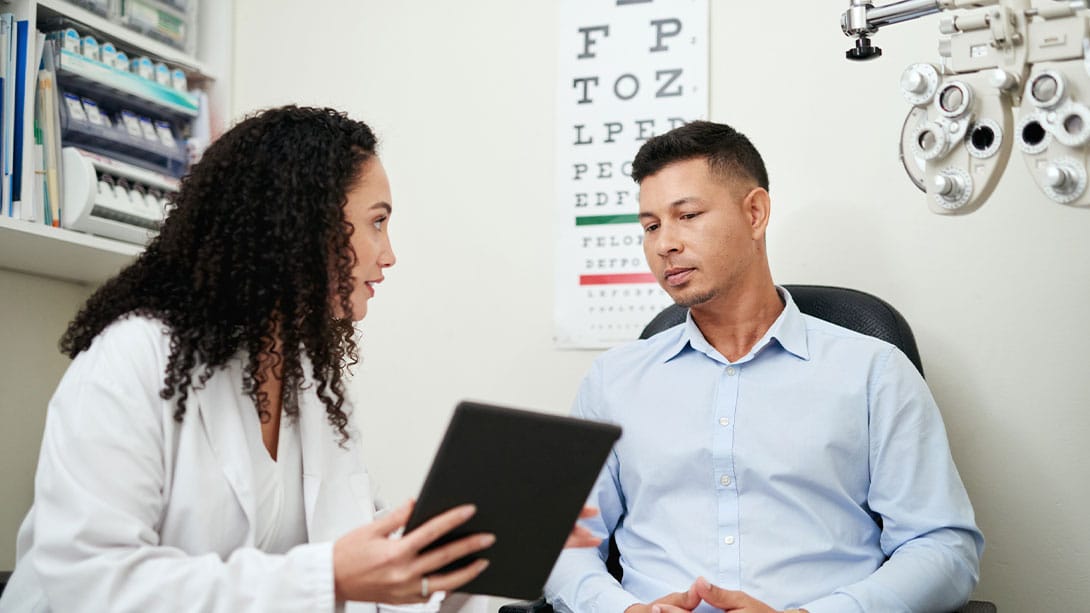Categories
If you’ve noticed your vision becoming increasingly blurry, colors appearing dull, or glare from headlights making it hard to drive at night, you may have cataracts. These gradual changes can creep up over time, often making everyday tasks like reading, watching TV, or recognizing faces more difficult. In such cases, it may be time to consider cataract surgery.
At Magruder Laser Vision, we understand that you may have many questions about cataract surgery. Our team is committed to ensuring you’re fully informed about every aspect of the procedure before proceeding. To help you feel confident in your care, we’ve outlined seven important questions to ask during your consultation.
What’s the difference between laser and traditional cataract surgery?
Cataracts are typically removed by making a small incision in the eye and replacing the cloudy lens with a clear artificial one. While traditional surgery relies on manual instruments, laser-assisted surgery uses computer-guided laser systems for greater precision.
At Magruder Laser Vision, we offer state-of-the-art laser cataract surgery using advanced technology that allows us to make more accurate incisions and lens adjustments. This often results in shorter recovery times and better visual outcomes. Asking about the technique helps you understand the advantages of laser precision and whether it’s right for your case.
Which type of intraocular lens (IOL) is best for me?
After your cataract is removed, it will be replaced with an intraocular lens (IOL). Choosing the right lens is key to achieving your best vision after surgery. There are several types available:
- Monofocal IOLs provide clear vision at one distance, usually far. You may still need glasses for reading or intermediate tasks.
- Extended Depth of Focus (EDOF) lenses offer a broader range of vision, helping reduce the need for glasses across multiple distances.
- Light Adjustable Lenses (LALs) are customizable after surgery using UV light treatments. This advanced technology allows your surgeon to fine-tune your vision postoperatively, something no other IOL can offer.
Will I still need glasses after cataract surgery?
This depends on your vision before surgery and the type of IOL implanted. With monofocal lenses, you’ll likely need glasses for near or intermediate vision. EDOF lenses reduce this dependence, and LALs allow for the most customized, glasses-free outcomes.
One of the advantages of choosing Magruder Laser Vision is access to cutting-edge lenses and technology that maximize your visual independence. We’ll help you determine the IOL option that gives you the freedom you’re looking for.
Who will be performing my surgery?
Knowing who will perform your procedure is essential. Ask about your surgeon’s credentials, experience, and outcomes. Meeting your surgeon before the procedure also helps build trust and gives you the opportunity to ask questions about the surgery and recovery.
At Magruder Laser Vision, our board-certified ophthalmologists and surgeons are recognized leaders in the field of cataract and refractive surgery. With decades of combined experience and a commitment to innovation, our team is known throughout Central Florida for delivering exceptional surgical outcomes in a comfortable environment.
What are the costs, and will insurance cover the procedure?
Cataract surgery is usually covered by Medicare and most private insurance plans when it’s deemed medically necessary. However, premium lens options and laser-assisted techniques may involve additional out-of-pocket costs.
Ask for a clear breakdown of what your insurance will cover and what you might be responsible for. At Magruder Laser Vision, our team will review your benefits, explain your options, and help you make an informed financial decision, so there are no surprises later on.
What should I expect during recovery?
Cataract surgery is a quick outpatient procedure, but it’s still important to know what to expect afterward. Most patients experience some blurriness, light sensitivity, or mild discomfort in the hours or days after surgery. Clear vision usually returns quickly, though full stabilization may take several weeks.
If you receive a Light Adjustable Lens, you’ll need to attend follow-up sessions to fine-tune your vision and wear UV-protective glasses in the meantime. We’ll provide clear post-op instructions and guide you through each stage of healing to ensure a successful recovery.
How should I prepare for surgery?
During your preoperative appointment, your eyes will be thoroughly evaluated to ensure you’re a candidate for cataract surgery and to measure the correct power for your replacement lens. You’ll be given pre-surgery eye drops, dietary instructions, and medication guidance to follow in the days leading up to the procedure.
You should also ask about transportation on the day of surgery, what to wear, and when you can return to work or daily activities. Our team at Magruder Laser Vision will make sure you have a personalized preparation plan so you can walk into surgery feeling prepared.
Meet our surgeons to learn about cataract surgery
Asking the right questions before cataract surgery helps ensure the best possible outcome. At Magruder Laser Vision in Orlando, we believe well-informed patients are the most satisfied ones. Whether you’re exploring lens options, learning about the benefits of laser technology, or wondering about life after surgery, we encourage you to clarify any concerns you may have.
Schedule your consultation today to meet our surgeons and learn more about cataract surgery.
